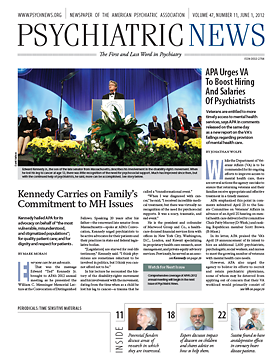New information from University of Chicago researchers indicates the need for more clinical investigation into the effects of the atypical antipsychotic olanzapine on the core features of anorexia nervosa.
Stephanie Dulawa, Ph.D., an assistant professor in the Department of Psychiatry and Behavioral Neuroscience at the University of Chicago, and her colleagues published in the online March 7 Neuropsychopharmacology the results of a study in which they found that olanzapine, but not the antidepressant fluoxetine, reduces activity-based anorexia in mice.
They first assessed mouse strains for susceptibility to activity-based anorexia and then evaluated the effects of different food-access durations.
They found that experimentally naïve female mice of the Balb/cJ strain exhibited significantly shorter survival time (days until 25 percent bodyweight loss) compared with another strain. “Our findings indicate that Balb/cJ mice exhibit high susceptibility to developing activity-based anorexia and exhibit a neurochemical profile that supports use of this strain as an anorexia nervosa-like mouse,” they said. They also found that six hours of food access reduced survival in mice housed with wheels without reducing survival in mice housed without wheels.
Administering fluoxetine or olanzapine to these mice under these feeding conditions resulted in greater survivability of mice given olanzapine, who showed a reduced occurrence of activity-based anorexia.
New Data Back Earlier Findings
Their conclusions support the findings of Hany Bissada, M.D., an associate professor of psychiatry at the University of Ottawa and director of the Regional Centre for the Treatment of Eating Disorders at Ottawa Hospital. Bissada and his colleagues performed a randomized, double-blind, placebo-controlled trial of olanzapine in the treatment of low body weight and obsessive thinking in women with anorexia nervosa (American Journal of Psychiatry, October 2008), concluding that olanzapine may be safely used in achieving more rapid weight gain and improvement in obsessive symptoms in women with anorexia nervosa.
Other recent studies have not as strongly supported the use of olanzapine as an anorexia nervosa treatment. Mark Norris, M.D., an assistant professor of pediatrics at the Children’s Hospital of Eastern Ontario, and his colleagues recently performed a retrospective matched-groups comparison study of olanzapine for adjunctive treatment of adolescents with anorexia nervosa (Journal of Child and Adolescent Psychopharmacology, 2011), but wrote that they were “unable to draw any firm conclusions regarding the potential efficacy of olanzapine.” Their analysis did, however, suggest that olanzapine is often prescribed for those with greater illness severity.
Norris and colleagues expressed concern about the side effects associated with olanzapine, citing studies that found its use was associated with an increased risk of dyslipidemia and diabetes mellitus compared with other atypical antipsychotics.
Little Efficacy Seen in Adolescent Study
Vivian Kafantaris, M.D., a child and adolescent psychiatrist at the Zucker Hillside Hospital in Glen Oaks, N.Y., and colleagues also recently performed a placebo-controlled pilot study of adjunctive olanzapine for adolescents with anorexia nervosa (Journal of Child and Adolescent Psychopharmacology, June 2011), but concluded that their findings, while admittedly preliminary, did not support a role for adjunctive olanzapine for underweight adolescent girls with anorexia nervosa–restricting type who are receiving standard care in an eating disorder treatment program.
“Several factors could have contributed to the negative findings of this study, which had a small sample size (n=15 total),” Dulawa explained to Psychiatric News. “This study used a fixed dose for all subjects, which increased over time to 10 mg/kg of olanzapine, while other studies have reported significant weight gain using lower doses (2.5 mg/kg). Furthermore, this study lasted 10 weeks, while therapeutic effects of olanzapine in anorexia nervosa have been reported to improve up to nine months into treatment. Therefore, dosing and chronicity of olanzapine might not have been optimized in this study.”
Despite their variable findings, all of these researchers agreed on one thing: Olanzapine deserves a closer look and might eventually be the first pharmacologic treatment for anorexia nervosa, or at least a prototype of the first one. But more information is needed to elucidate the drug’s therapeutic mechanism in anorexia patients.
Dulawa and her colleagues have already moved in that direction. “We are currently attempting to identify which aspect of olanzapine’s complex pharmacology reduces activity-based anorexia, an animal model for anorexia nervosa. This information could lead to the development of more selective compounds with fewer side effects for treating anorexia nervosa,” she told Psychiatric News.
The work was supported by grants from the National Institutes of Health. Coauthor Daniel Le Grange is supported by a grant from the National Institute of Mental Health and honoraria from the Training Institute for Child and Adolescent Eating Disorders.


